- Home
- Pamela Brown
The Swish of the Curtain Page 6
The Swish of the Curtain Read online
Page 6
They scrambled through their teas, dashed through their homework in a way that made their parents say, “When I was at school…” and at quarter past six were seated round the dressing-room table.
“How different it looks and smells from last time we sat round like this,” remarked Sandra.
“And how shiny the table is! You can see your reflection in it,” said Lyn,
“And lovely blue chairs.” Maddy patted them appreciatively.
They made another tour of inspection, gloating over their handiwork.
“See how beautifully the stage curtains hang.”
“Doesn’t the floor look clean?”
“And the piano has cleaned up well.”
Lyn pulled back one of the stage curtains. “It doesn’t swish, does it? It sort of rattles. A real curtain should swish.”
“These don’t, because they only draw back instead of going up,” explained Nigel.
“Of course! I wondered what was wrong.”
“One day we’ll be able to afford real ones,” he promised, “with wings and side-flaps, and what-not. And now, to business.”
They reluctantly returned to the dressing-room and sat down again.
“It’s nearly half-past six,” he said, “and we must be home by nine; but we’re not leaving this hall until the programme is settled, so if we don’t concentrate we shall get in a row for being late home.”
The others put on an earnest, businesslike expression. Nigel brought out a notebook and pencil, and the meeting began.
“I propose,” he said, “that we each take a special job that we can do. F’rinstance, Vicky had better be ballet mistress.”
“Gosh!” exclaimed Bulldog, alarmed. “We’ve not got to ballet dance, have we?” The idea of Bulldog the jazz fiend, ballet dancing, amused them highly, but Nigel comforted him by saying, “I bags the girls stick to that side of the affair.”
“What shall I be?” Maddy was anxious to know.
“Call boy, prompter, scene-shifter, messenger, in fact, bottle-washer-in-chief,” Nigel informed her.
“Can I be wardrobe mistress?” asked Sandra.
“Sure you can. And Jeremy must be musical director, and Bulldog can be in charge of lighting, properties, etc.”
“I’m scenic artist and stage manager, and Lyn’s going to produce; and everyone must stick to their own job and not interfere with other people. In a book I’ve been reading on amateur acting—”
“Have you been reading it up? So’ve I,” said Lyn.
“She made me wade through it, too,” grumbled Jeremy.
“Vicky and I read it, and you lent it to Sandra, didn’t you, Vick?”
“Yes, Maddy and I read it,” said Sandra. “We did the exercises in acting, too. Maddy got quite good at bursting into tears.”
“Shall I show you?” asked Maddy.
“Go on.”
She turned her back for a minute, they saw her shoulders heave, and when she faced them again tears were streaming down her plump cheeks, and she sobbed very realistically.
“Bravo! Jolly fine,” commented Lyn. “I tried, and after a bit I got it, but I know I couldn’t do it now.”
“It’s all right to start, but I can’t stop,” sobbed Maddy miserably.
She continued to cry for the next ten minutes, despite their united efforts to calm her.
“It’s no good,” she wailed. “I’m not unhappy at all – I just can’t stop!”
“Try standing on your head,” suggested Vicky.
Maddy obeyed, and instantly her sobs ceased. They drew sighs of relief, and Maddy grinned.
“Funny, aren’t I?”
“You’re a little nuisance,” said Nigel good-humouredly.
“And now to business once more. What is the programme to consist of?”
“There must be one straight play,” said Lyn firmly.
Nigel made a note of it.
“And something musical,” Jeremy stipulated.
Nigel put this down.
“And something funny,” demanded Maddy.
Nigel scribbled again.
“And something exciting,” said Bulldog.
“That will come under the play.”
“And something with picturesque costumes,” suggested Sandra.
“That’ll be the musical thing or the play.”
“Some dancing,” was Vicky’s suggestion.
“In the ‘musical’, too. Now, let’s decide on the play. What’s it to be?”
“Romeo and Juliet.” This, of course, was from Lyn.
“Shakespeare’s quite impossible with our small stage and equipment and lighting and experience,” Nigel decided.
“Too many characters, too,” added Sandra.
“I bags we make up our own,” said Vicky, “because no one writes decent plays for children.”
“They don’t,” said Jeremy. “They’re either chock-full of fairies flitting about, or else they’re silly little farces with no point.”
“But can we write our own?” Nigel asked doubtfully. “Anyone offer to take it on?”
No one did, and things had come to a deadlock when Sandra suggested, “Couldn’t we make up the plot together, and then write the dialogue, each person saying what they think the character they are playing would say.”
“We could try it that way, of course,” agreed Nigel and the others.
Jeremy blushed and said uncertainly, “I’ll write the musical sketch, if you like. That is – I mean, if no one else… you see, I…” but his nervousness was overwhelmed by the rejoicing at this suggestion.
“Good old Jerry.”
“I never knew you wrote songs,” said Nigel with interest.
“The top of the piano is covered with manuscripts, but he hardly ever finishes one,” explained Lyn.
“What sort of accompaniment shall we have?” asked Sandra. “Jeremy plays the piano, and so do I, and he plays the violin.”
“And I play the mouth-organ,” added Maddy.
“It all depends in what setting the ‘musical’ is. If it’s in a drawing-room we can have the piano on the stage; if it’s gipsies, or something like that, Jeremy can play his violin; and if it’s a slum Maddy can play her harmonica.”
The mouth-organist stuck out her tongue.
“I bags it’s gipsies,” said Lyn eagerly.
“Gipsies are overdone,” Jeremy disagreed, “and people are tired of them, because I hear the last item on Mrs. Potter-Smith’s programme was a gipsies’ camp-fire.”
“I’d like to see Mrs. Potter-Smith kicking a tambourine,” giggled Maddy.
“Let’s have peasants of some kind,” Sandra begged, “because they’re so picturesque.”
“Italian, French, or Spanish peasants?”
“Spanish,” said Lyn definitely, “because in the box that Mrs. Bell gave us there’s a pair of castanets.”
“I’ve got an idea.”
Jeremy ran out on to the stage and began to play the piano; the others followed him. He was improvising a wild, rhythmic tune.
“Enter some Spanish muleteers and sing this. It’s something about going to an inn to dance, and señoritas and cypress groves.” The notes changed to a slow provocative little tune. “Enter the aforesaid señoritas singing this and introducing themselves; then one of the men sings a song something like this,” he played a few mournful, wailing chords. Then suddenly he stopped, blushing. “Sorry, I didn’t mean to go on so. It was just an idea – forget it.”
But they were all enthusiastic. Nigel thumped him on the back.
“Why, boy, that was wonderful! I’ve never heard such music. Where did you get it from?”
“I saw one of the performances of the Basque refugee children in London, and I tried to make it like that.”
Vicky’s eyes were shining. “If you can get a tune like that for me to dance to I shall love you for ever after.”
“We’d better each decide what we want to do in the musical, and give our orders to Jeremy and he’ll write it
up,” said Nigel.
Jeremy found a piece of paper and wrote down, “Opening Chorus”. “That had better be men, I think.” He put Nigel’s, Bulldog’s, and his own name down. “Now what on earth shall we do with Maddy? She can’t possibly be a señorita, she’s not glamorous enough, and she’s too fat.”
“And I can’t make eyes!” added Maddy, casting a nasty look at Lyn.
“I think she’d better be a man,” said Sandra; “but I can’t think what she can do.”
“I could teach her an easy little tap dance,” offered Vicky, “if Jeremy concocted a tune first.”
“I’d love to tap dance,” beamed Maddy. “Thanks, Vick.”
“Now the señoritas – that’s Lyn, Sandra, and Vicky. A song for them. Now a solo of some kind. Any offers? Come on, Nigel, you’ll sing, won’t you?” urged Jeremy.
“No, I will not. Once and for all – no!”
“Well, one boy has got to sing, because that last tune can’t be wasted, and I’ve already thought of some words for it.”
“Sing it yourself,” suggested Vicky.
“Lor’ no! I’ve got a voice like a squeaking brake now.”
“He used to look sweet when he was in the choir before his voice broke. Mrs. Bell told his mother he looked like an angel,” teased Maddy, and received a kick under the table.
Bulldog was looking apprehensive. He could feel it coming, and it came.
“Well, Bulldog must sing,” Jeremy decided.
Bulldog searched for words with which to express himself, but only succeeded in making vaguely appalled noises.
“Yes, of course he must. He was in the choir at our old school,” Nigel told them.
“Right-o, I’ll get a song for him, and one for Sandra. Would you prefer a happy one or a sad one?”
“Sad, please, and nice and soprano.”
“What’s your compass?”
“Middle C to high G.”
Jeremy made a note of it, and then wrote “Dances”. “Now who will dance? Vicky, for one. Solo?”
“If you think I’m good enough.” She looked inquiringly at Nigel, and he nodded.
“Then a duet dance for Lyn and Sandra, I presume?” went on Jeremy.
“What about you? What are you doing?” Vicky wanted to know.
“Oh, I’ll be accompanying.”
“But you must have a solo. Do a violin solo.”
He agreed, and it was arranged that, for the songs, the accompaniment would be violin, and he would have to go off-stage and play the piano for the dancing.
“Where is this affair set, by the way?” asked Bulldog.
“At an inn at the foot of some mountains, I should think,” said Jeremy.
“In the garden, I bags,” suggested Nigel; “then I can draw a moon and some cypress trees on the backcloth.”
“We’ll end it with a song all together.” Jeremy completed his notes.
“Now, has anyone anything else to say before we pass on to the next item,” said the chairman.
Sandra had been making rough sketches of costumes, and now said, “I should be glad of any old lengths of brightly coloured materials, and anything to make frills of.”
“Isn’t it rather early to start thinking about clothes?” demurred Lyn. “When are we going to give the concert?”
“I thought the evening of the day we break up for the summer hols. would be the best time,” said Nigel, “because no one will have gone away then. But we can’t decide on a date until we see how things are going.”
Maddy bounced up and down on her chair. “Isn’t it all exciting! I keep on having trickly feelings down my spine.”
“Now for the next item, which I have got down as ‘Something Funny’.”
“It’ll probably all be screamingly funny, especially the serious parts,” said Lyn pessimistically.
“Can anyone think of anything funny?”
“Yes, Bulldog ballet dancing, and Maddy playing the mouth-organ,” suggested Jeremy.
“That,” said Maddy haughtily, “would only appeal to some senses of humour.”
“Couldn’t someone recite a poem, and the others act it?” suggested Lyn. “It could be a cautionary tale or a nonsense rhyme.”
“I bags we keep to writing our own stuff, because aren’t there acting fees or something, if you use other people’s plays?” said Nigel.
“Yes, I believe there are, and we can’t afford that.”
Bulldog had been looking thoughtful. “You know you said I should be funny ballet dancing? Well, why shouldn’t I, just to make people laugh?”
“That’s an idea,” agreed Nigel eagerly; “a humorous dancing-class. Lyn could be Madame Popoffski or some peculiar name like that, we three boys could be new pupils, little girls brought by Maddy, our nurse, and Sandra could be the meek lady pianist with a cold in her head.”
“Good idea.”
“It ought to be funny.”
“But what about me? What part shall I play?” asked Vicky.
“You’re the drawback. You dance too well to be funny.” Nigel wrinkled his brow.
“Could she not be in this, but have a separate solo of her own in between this item and the next, to give us time to dress?” suggested Sandra.
It was decided that Vicky should do a toe dance and Jeremy should accompany her on the piano.
“And now,” said Nigel, “the big event. The play, which has got to be exciting.”
“And serious,” added Vicky.
“And colourful,” put in Sandra.
“And emotional,” said Lyn.
“But not sloppy,” urged Bulldog.
“What do you mean by sloppy?” asked Lyn, laughing.
“Not a lot of falling in love.”
“Don’t be silly. You can’t have a play without some love interest. But anyhow, no one will have to fall in love with you, mercifully, because you’re too short,” replied Lyn scathingly.
Bulldog was mystified. “What’s height got to do with it?”
“A heroine can’t be kissed by the hero if he has to stand on tiptoe to do it.”
“Golly! Are we going to have kissing in it?” Bulldog looked shocked.
“Of course,” said Lyn scornfully. “Have you ever seen a play or a film that hasn’t any?”
Bulldog scowled.
Sandra said slowly, “This is rather an awkward point. Of course, the play must have a romance in it, but will all the old ladies in the audience stand for it?”
“It’s only a play,” Lyn pointed out petulantly.
“Yes, but will the audience think it’s ‘right and proper’?” asked Nigel seriously.
“The question is; who’s going to have the chief part?” said Vicky.
“Lyn,” said Sandra and Nigel together.
“Well, it’s all right, then. Jeremy can be the hero, and it’ll be quite O.K. for him to kiss her.”
They were all relieved except Jeremy. “Have I got to kiss her in front of all those people? S’posing they don’t realize she’s my sister – we’re not a bit alike. I’m like Dad and she’s like Mummy.”
“They oughtn’t to be thinking about Lynette and Jeremy Darwin, but about the hero and heroine,” Lyn reminded him.
“Now we must decide on what kind of characters we’re to be. Everyone write down what character they’d like to play. Remember it’s not to be modern.”
This idea was not a success. Maddy wrote down a dragon like St. George’s, Bulldog wrote a cave man, Vicky wrote a Roman soldier, Lyn wanted to be an Egyptian princess, Sandra a Victorian dowager, Jeremy wrote a troubadour, and Nigel a highwayman.
When the papers were read there was a howl of laughter.
“It would need Bernard Shaw to write a play bringing in this assortment of characters,” remarked Jeremy.
“I think the hero and heroine ought to choose the period,” said Nigel.
“It’s all the same to me,” said the hero carelessly. “I’ll probably have to be dressed up in a lot of ‘goo’ w
hatever period it is.”
“I think Cavalier and Roundhead,” decided Lyn, “then Nigel can be the Roundhead villain. Jeremy will look lovely in a plumed hat and silk knee-breeches. Now let’s decide on the plot.”
They gazed at the beams across the ceiling and let loose their imaginations.
“I am the beautiful daughter of a Royalist soldier,” Lyn announced dreamily.
“Your father is very rich, and you live in a marvellous mansion,” added Vicky.
“You’re in love with me, the gardener, who, in the first act, brings you the news that war is declared between Parliament and the King. I go away to fight on Cromwell’s side (because I don’t think a plumed hat would suit me), and you hate me,” said Jeremy.
Sandra went on, “Lyn’s father goes to fight for the King. He comes home wounded and followed by Cromwell’s men, under the command of the gardener, now a captain. That is Act II.”
“In Act III, Scene 1, the gardener, because of his love for Lyn, lets the father go free, and provides the whole family with passes and money, to get to Holland.” This was Nigel’s contribution.
“The last scene is the gardener arriving in Holland, having given up the chance of being a general in Cromwell’s army, to come and marry me, and we live happily ever after!” ended Lyn triumphantly.
They were pleased and surprised at the ease with which they had evolved a plot.
“That’s hot!” said Nigel. “Now for characters. Lyn – the girl, Jeremy – the gardener, me – the father, Sandra – the mother. That leaves Vicky, Bulldog, and Maddy. Bulldog can be the brutal Roundhead sergeant. Vicky – Lyn’s maid, and Maddy – another soldier, and any other odd characters we may have to bring in.”
Maddy sighed. “Why do I always have to play odd people?”
“Obvious reasons!” Jeremy told her.
Nigel looked at his watch. “We’ve got some time before we need start for home, so let’s begin to write the play. Who writes quickly?”
“Sandra does.”
He handed her a pencil and an exercise book which he had brought in anticipation.
“What is it to be called?” she asked.
“We’ll decide that afterwards. Put Act I, and we’ll fire away.”
Sandra said slowly as she wrote, “Act I. The scene is laid – where is it laid?” she asked.
“In the garden of Sir Someone’s estate.”

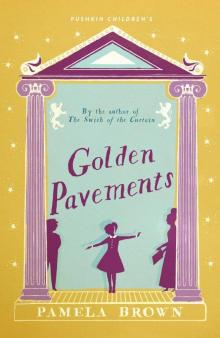 Golden Pavements
Golden Pavements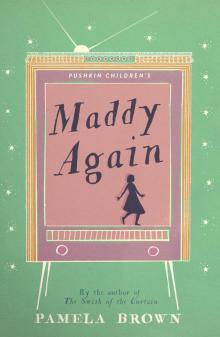 Maddy Again
Maddy Again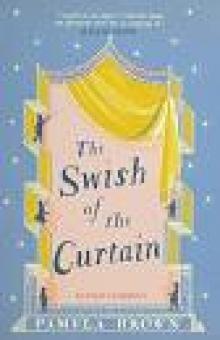 The Swish of the Curtain (Blue Door Book 1)
The Swish of the Curtain (Blue Door Book 1)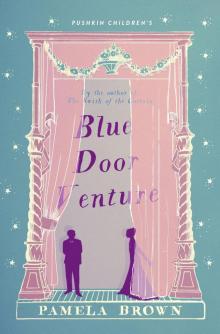 Blue Door Venture
Blue Door Venture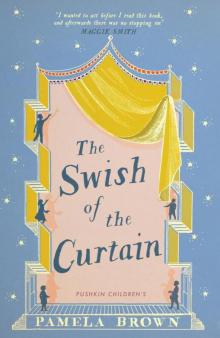 The Swish of the Curtain
The Swish of the Curtain